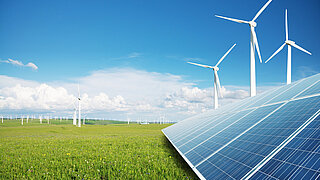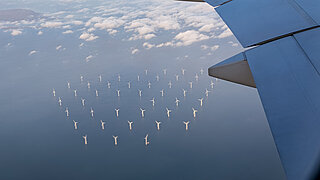Foundations laid for the transformation of aviation
Copyright: Copyright: iStock / baranozdemir
PtX Lab Lausitz and partners published a study on the development of standards for sustainable synthetic kerosene.
The production of synthetic kerosene - also known as eKerosene or PtL for aviation - is costly, complex and above all also requires the intensive use of various resources. So how, for example, must energy, water and raw materials be used so that the "green" fuel actually works to the benefit of the environment and society? If negative ecological, economic and social consequences are to be avoided, there is a need for clearly defined, credible requirements for the sustainability of the production and use of eKerosene that are accepted by various actors. The public discussion on such standards has been very limited so far.
Viable standards for today and the future
In spring 2022, the PtX Lab Lausitz therefore commissioned the research institutions Ludwig-Bölkow-Systemtechnik (LBST) and ifeu - Institute for Energy and Environmental Research to develop criteria and indicators for the sustainability of PtL products. The aim is to design ambitious standards - in each case suitable for the technical possibilities in the present and future. The proposal defined in the study as a "long-term standard" formulates an ideal target for sustainably produced synthetic fuel for aviation based on the PtL process. In addition, the "short-term standard" represents a compromise between a rapid market ramp-up and the best possible sustainability.
In the first step of the study, the environmental, economic, social and political dimensions of sustainability for PtX in general were defined. In the second step, LBST and ifeu worked out specific sustainability criteria for PtL in air transport, which are further concretised in the form of indicators for the long-term standard. Based on this, the study also offers suggestions on how the standard can be integrated into a certification system in terms of content and organisational structure. Key points of the study "Development of PtX sustainability standards and indicators" are:
Central to sustainability: the source of CO2
The source of CO2 represents - in addition to the use of primary energy - another central element for assessing the sustainability of the production of synthesised hydrocarbons. Depending on the source, other important aspects must be added for a comprehensive assessment in addition to the basic balancing of greenhouse gases (GHG).
The study authors analyse the contribution of CO2 sources to the GHG balance of PtL products according to different accounting approaches, among others based on two ISO standards. The authors expect the criteria proposed by the European Commission (draft Delegated Act (DA) on Article 28(5) of the EU Directive 2018/2001 (RED II) of 20.0522) to be the minimum legal standard for electricity-based fuels produced in and imported to Europe. This does not explicitly exclude certain CO2 sources, but it follows from the minimum requirement for greenhouse gas reduction that CO2 from the burning of fossil fuels as the main product (such as from coal-fired power plants) would not be permitted.
The long-term standard is consistently oriented towards ISO Standard 14067 and therefore only allows Direct Air Capture (DAC) and biogenic CO2 sources. However, other sustainability requirements speak against classifying carbon from biomass as sustainable in the long term. In particular, the entrenchment of unsustainable practices in agriculture and waste management (lock-in effects) argue against this.
Difficult to grasp: resource efficiency
What are appropriate criteria for classifying resource efficiency in PtL production? It does not seem appropriate to demand regular raw material balances from producers in addition to the GHG balance. This would require very comprehensive and complex figures covering the entire life cycle of all components. In view of the lack of data, the authors suggest choosing a criterion in the context of certification that distinguishes a good practice from a less good one in the course of the production chain. Thus, LBST and ifeu position the Cumulative Energy Expenditure (CED) as a "proxy" for resource efficiency.
Since it is currently scientifically debatable whether this "proxy" is suitable, the PtX Lab Lausitz will continue to work on the content of this topic. In order to address the identified bottleneck in the development and harmonisation of sustainability criteria, the PtX Lab Lausitz is planning a follow-up study. This will analyse the resource requirements and the ecological and economic limits for meeting these requirements.
Further need for research and discussion
The Ptx Lab also sees a need for further research and discussion on other criteria. This applies, for example, to the presentation of social and economic development potentials. There is also the question of whether and how further criteria can be included in the consideration, for example with regard to good corporate governance or risk management.
The PtX Lab Lausitz will continue the exchange and the technical work on establishing sustainability standards for PtL products. Further publications from the PtX Lab Lausitz on the definition and certification of sustainability for PtX products, technologies and regulations will follow. The staff will be happy to answer questions and exchange information. If you are interested, please contact Anita Demuth, Deputy Head of PtX Lab Lausitz, using the contact details below.
Contact
Anita Demuth
Head of Section PtX Mobility
+49 152 28 400 735
Write E-Mail
more information

